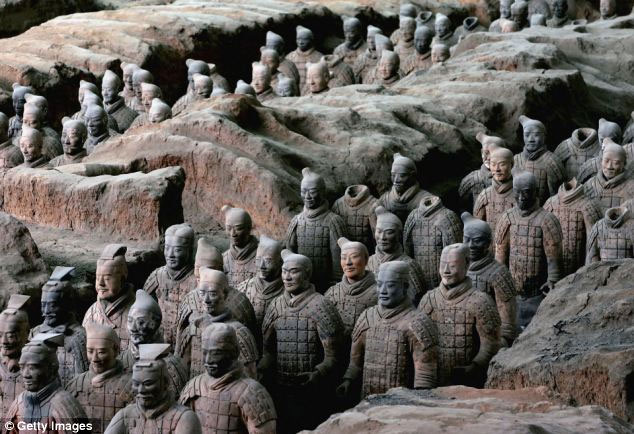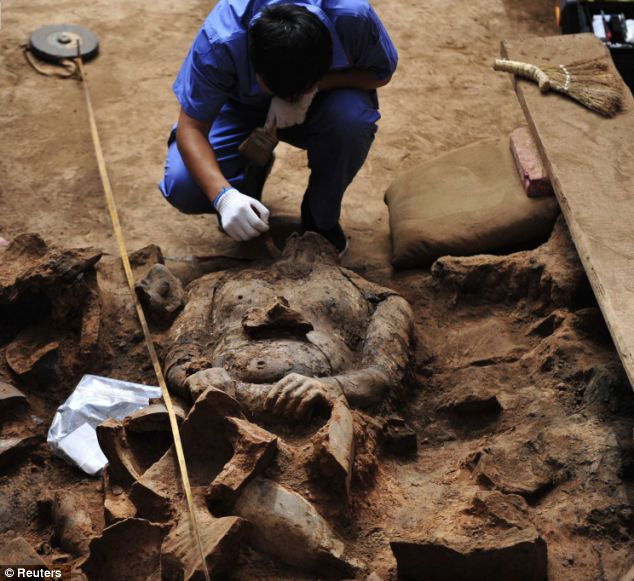China suspended excavation of the tomb of Qin Shi Huang
The Chinese government decided to suspend the excavation of the tomb of Qin Shihuang emperor - the first king of ancient China and 6,000 terracotta warriors currently located in Xi'an City, Shaanxi Province.
>>>Image: Excavating hundreds of 2000-year-old warriors
Qin Shihuang - the first king of ancient China was buried more than 2,000 years ago in the largest tomb ever built by Chinese people.
The system protects the tomb very impressively, shown through underground trenches filled with toxic mercury vapor to prevent illegal intruders from awakening the emperor's sleep as well as thieves. to 'steal' jewels in the tomb.

Terracotta warriors in Tomb of Emperor Qin Shihuang
The Qin Shihuang Tomb is of a caliber of a land-based city, filled with all the items that serve the emperor's life beyond the world.
The first emperor of China had cast terracotta statues representing soldiers, concubines, officials and servants, then buried them under the grave when he died.
In 1974 during a well digging, farmers living near Xi'an City accidentally discovered the first real-sized earthenware statue out of a total of 8,000 images buried in the tomb of the emperor. .
Archaeologist Kristin Romey (USA) said that so far the scientific community has unearthed 2,000 statues of terracotta warriors. However, the excavation process has now been suspended.
'Partly because spirituality does not want to disturb the deceased, it is important that no scientist has found the right technology to dig deep into the earth and excavate the tomb' , Romey said. .

That means that archaeologists will not be able to continue to access the tomb of Qin Shihuang until they develop a new technology to ensure the integrity of the walls during excavation.
'The Chinese government's decision is a right step,' Ms. Romey said.
Therefore, Ms Rome hopes in the future, the introduction of a micro-exploration robot with underground camera system will help protect the remaining relics in the archaeological site.
However, the Chinese government's decision to suspend excavation also aims to prevent archaeologists from going into the center of the tomb - the burial place of Qin Shihuang emperor - the area that was suspected to be airtight. mercury danger.
Reference: Daily Mail
- The mystery of the tomb Qin Shihuang
- Why hasn't China dared to excavate the tomb of Qin Shui Huang?
- China excavated the tomb of Qin Shihuang's grandmother
- Find the culprit who burned the tomb of Tan Thuy Hoang
- Excavating the tomb of Qin Shui Huang, discovering the animal world inside
- 600-year-old citadel in Xi'an
- Video: Touch the dog to find the owner on the bus every day
- Excavation of the tomb of Queen Cao Cao's grandson
- The skeleton of the ancient tomb of War Kingdom disappeared mysteriously
- Image: Excavating the tomb of the post-Ming Dynasty
- Excavation of the grave of ancient Egyptian priests
- Excavation of the pre-Inca aristocratic tomb
 Discovered an ancient centipede fossil 99 million years old
Discovered an ancient centipede fossil 99 million years old Discovered bat-like dinosaurs in China
Discovered bat-like dinosaurs in China Discovered a 200-year-old bronze cannon of the coast
Discovered a 200-year-old bronze cannon of the coast Discover 305 million-year-old spider fossils
Discover 305 million-year-old spider fossils